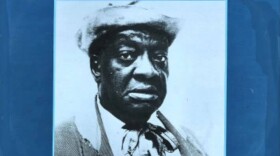Embedded in the Blue Ridge Mountains is a time capsule that could hold the solution to the climate crisis.
OK, it’s not really a time capsule. It’s a basement warehouse in downtown Asheville, North Carolina. It serves as headquarters for the National Centers for Environmental Information (NCEI), a federal agency that manages one of the largest archives of climate and weather data in the world.
“This room is the foundation for climate research, being kind of at the bottom,” said Jason Cooper, an archivist at NCEI. “This is the raw original observations on which all of our understanding of the climate and weather conditions are built.”
Inside NCEI’s warehouse, Cooper helps oversee the preservation of more than 37,000 archival materials, some of which date back centuries ago.
“The oldest record that we have in this room is from 1735 from Charleston, South Carolina, it's obviously a colonial record before the United States even existed,” said Cooper.

The archives at NCEI include every kind of climate data imaginable, from measurements of hundred-year-old hurricanes to film strips of solar observations. And these materials aren’t just gathering dust. As the detrimental effects of climate change continue to take different forms, from wildfires that shroud cities in smoke to extreme flooding in rural communities, people are increasingly looking to mitigate the impact of the climate crisis with models built on NCEI’s historical data.
“My place as an archivist is to hold that memory, if you will, that past memory that will inform what we do going forward," said Cooper.
Billion-dollar disasters
A few floors above NCEI’s archives, Adam Smith works to sound the alarm on weather and climate disasters happening right now across the country by putting a price tag on climate change. Smith is an applied climatologist at NCEI and the lead researcher for the U.S. Billion-Dollar Weather and Climate Disasters research program. Every year, Smith and his team release a report on the effects of billion-dollar disasters across the U.S.
“A billion-dollar disaster is really any of these different weather and climate extremes that have the potential to inflict a lot of impact on populations and on economies,” said Smith.
Smith and his team have tracked how this billion-dollar metric impacts a variety of places across the country dating back to 1980. The studies show that the frequency of billion-dollar disasters has steadily increased and that every state in the U.S. is vulnerable.
“Every state has been impacted by at least one billion-dollar disaster since 1980,” said Smith. “But certainly, the southwest, south central, and the southeastern parts of the country have had a higher frequency and higher costs from these billion-dollar disasters than in other parts of the country.”

The individual financial burden of these disasters is also felt unevenly across society.
“As with a lot of things, [you suffer more] if you don't have a financial safety net, like insurance, for example, on your home, or your vehicle, your business, your crops, or you don't have a social safety net to help recover after a disaster,” he said. “I think the haves and the have-nots will continue to grow, as far as the gap between those [is concerned] as we move into the future, if we don't better plan for these extremes that we know will continue.”
“They know their communities inside and out.”
There’s a growing pipeline of people and organizations throughout the country who are building links between NCEI’s data and communities who are at risk from climate change.
As the state climatologist of North Carolina, Kathie Dello is one of the folks leading that charge.
“We connect with people on what they love about North Carolina, what's worth saving, and what's worth building up so that North Carolina can thrive in a changing climate,” said Dello.
Dello and her team are based in Raleigh, but they work with government agencies, businesses and individual people across the state. They help diagnose what a specific community is going through and prescribe customized solutions for them.
“It's not just me as a climate scientist saying, ‘Here's an important thing you need to know about,’ but really understanding — us as researchers taking a step back and recognizing that they know their communities inside and out,” said Dello.
Farmer Joe Williams reached out last year to climatologists on Dello’s team. Williams helps operate Blue River Legacy Farms, a commercial blueberry farm near Elizabethtown in rural southeastern North Carolina. He wanted to know more about his farm and its relationship with the changing climate, something he’s seen with his own eyes.
“I mean, climate change is a reality, and I don't think anybody around here will deny that,” said Williams. “It doesn't matter, your background at all. When you spend as much time as we do outside— you know [it's happening].”
Accessible tools could be key
Climatologists helped Williams forecast temperatures on his farm all the way to the year 2045. Armed with that knowledge, he recently planted a two-acre test plot with nearly 20 different blueberry varieties. The goal is to identify new types of bushes that can grow comfortably in a changing North Carolina climate.

“Everyone has their own right and freedom to make the decisions that they want to on their farm,” said Williams. “But we all need to be informed of what's going on.”
That information very well may have its roots in the mountains of documents at NCEI’s warehouse in Asheville. But for his part, Williams is thankful that the raw data has been turned into a tool that’s clear and easy to use.
“We want simple things like, ‘Okay, we did all this research, and what is it telling you? Monday, turn the water on.’ Right? We just want to turn it into a simple directive. At the end of the day, that's all that really matters.”
North Carolina’s state climatologist Kathie Dello thinks that personalized and easily accessible tools like that could be one of the keys to adapting to the climate crisis — and maybe even preventing the worst of its fallout.
“Climate change isn't a data problem. If it were, we would have solved it by now,” said Dello.
“We know the climate is changing. We have temperature records. We have sea level rise. We can point to things on the ground. We've written so many reports. So we have to think about it more broadly than just giving people the data and hoping they understand it.”









